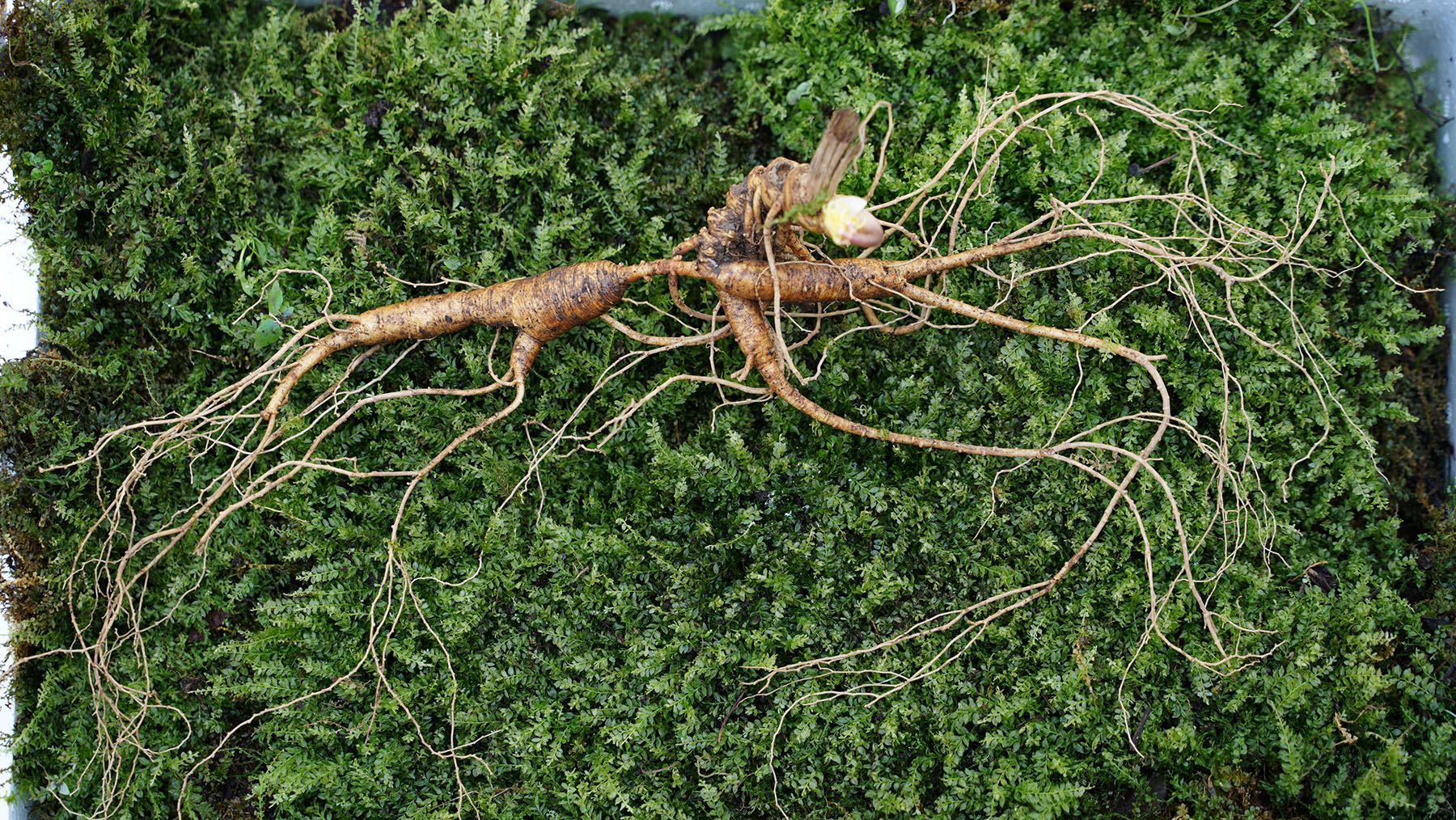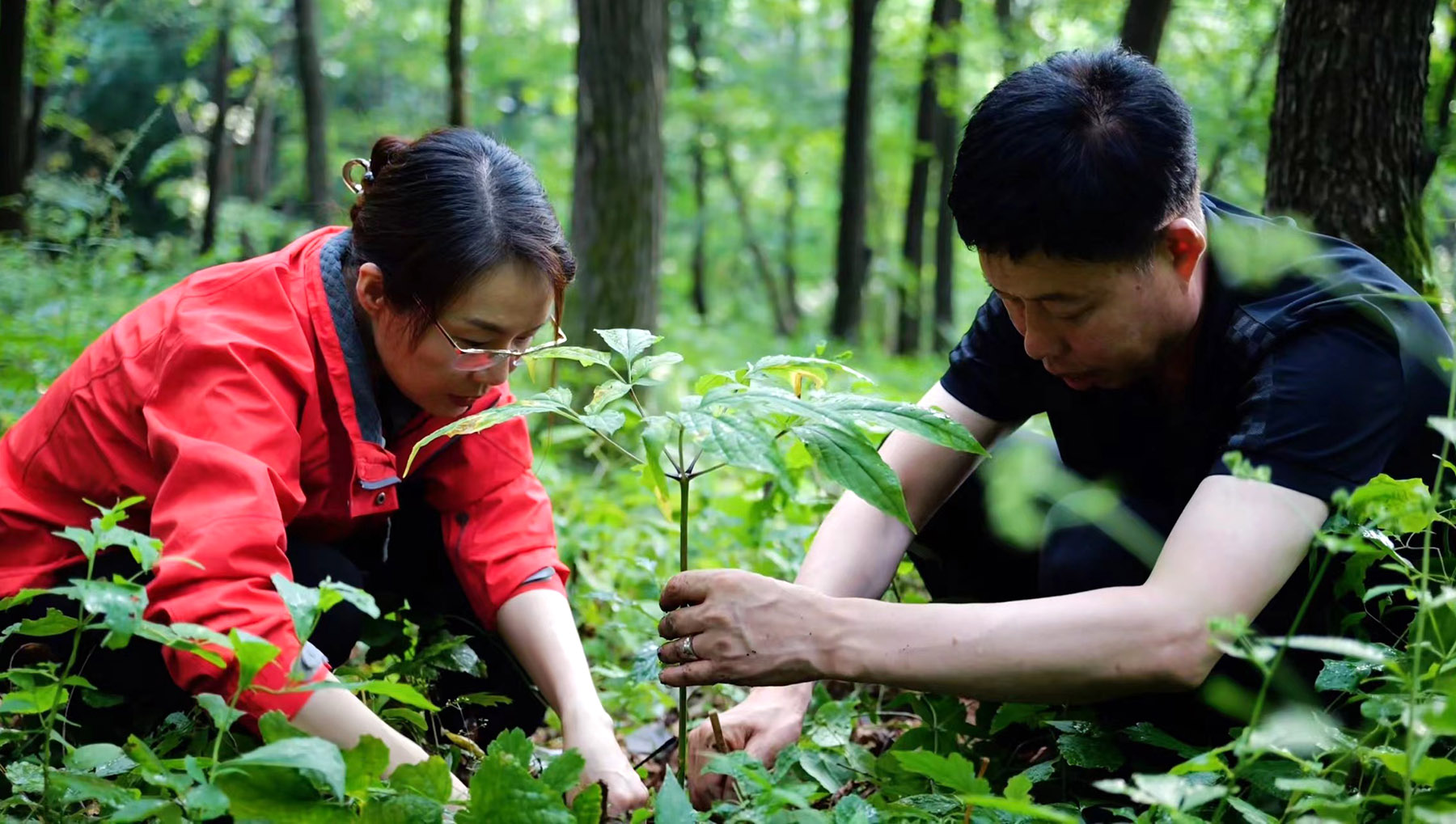Entrepreneurs, policies, branding, local advantages boost Liaoning's TCM herb

In the remote northeastern corner of China, what was once a local secret — the forest-grown ginseng — is now making its way into markets around the globe. This unlikely journey from obscurity to international acclaim is led by Chen Ruoqing, 41, a determined entrepreneur from the Hong Kong Special Administrative Region.
"My dream is to bring Huanren county's unique products, especially its forest-grown ginseng, to the world," she said.
The slow-growing, short plant with a fleshy root has been used in traditional Chinese medicine for centuries. It has not only carved a niche for itself in this distant county, but also reshaped the economic landscape of Huanren in Benxi, Liaoning province, where the rugged terrain meets the vast expanses of the Changbai Mountains.
Over a decade ago, when Chen first set foot in Liaoning, she could never have believed that the trip would completely change her life trajectory. The black soil region's vast agricultural potential captivated her, particularly Huanren's forest-grown ginseng, a plant that thrives in the pristine natural forests of the area.
READ MORE: Precious heritage of picking wild ginseng
Nestled in the foothills of the Changbai Mountains, Huanren boasts a forest coverage rate that makes it an ideal environment for growing forest ginseng. Unlike its cultivated counterparts, forest-grown ginseng requires at least 15 years to mature, drawing nutrients from the rich soil and vegetation of its environment. The result is a product of better quality, revered for its medicinal properties and health benefits.
"I traveled through both Jilin and Liaoning provinces, and ultimately, I chose Huanren for its unparalleled natural conditions for high-quality ginseng," Chen said. "The mature industry chain here also makes it the perfect place for my business."
Chen said she was also inspired by a speech given by Leung Chun-ying, vice-chairman of the National Committee of the Chinese People's Political Consultative Conference, who emphasized the importance of economic cooperation between Hong Kong and Liaoning.
Eyeing this opportunity, she founded Best Choice (Liaoning) Healthy Technology Co Ltd and launched the Yu Bu Sen brand, which focuses on promoting high-quality agricultural products from Liaoning. Chen said this venture is not only the realization of a personal dream, but also a way to give back to a land that has given her much.
For Huanren, ginseng is more than just a medicinal herb — it is the backbone of the local economy. Although the county has a small population of 230,000, it is home to over 300 processing enterprises specializing in ginseng and other local medicinal herbs.
"From seeding to final medicine products, our forest-grown ginseng industry has evolved into a comprehensive value chain," said Liu Minggang, Party secretary of Huanren.
With a complete industry chain, Huanren has attracted a slew of well-known companies such as Sh anghai Pharmaceutical Good Nurse Health Technology, Tianjin's Tasly Group and Beijing-based Tong Ren Tang.

The leading industry players have driven the development of over 1,000 varieties of products and more than 300 enterprises, giving Huanren's ginseng a distinct advantage in the development of a concentrated TCM industry, Liu said.
"This niche industry has indeed led our people to prosperity," Liu said, adding that more than 2,000 business entities are involved in the ginseng industry, providing about 100,000 jobs and raising the average annual income to an impressive 200,000 yuan ($28,022).
The county head also heralded a series of preferential policies, including housing subsidies and entrepreneurial support, to provide a pro-development environment for talent.
"We will also strengthen cooperation with universities and research institutions, establishing long-term mechanisms for talent cultivation and recruitment," he said.
With an annual production of about 30 metric tons of dried ginseng, Huanren now accounts for over 70 percent of China's total forest-grown ginseng output, said the county government.
As the local ginseng industry flourishes, so do export markets in over 20 countries and regions.
"I've been in the ginseng business since I was 16, and it's happy to see that more than 40 years later, our products are sold globally — in Southeast Asia, Europe and other global markets," said Wang Xingren, chairman of Liaoning Longshen Health Pharmaceutical Co Ltd, and Chen's business partner. "I hope to continue bringing our forest-grown ginseng from Huanren to the rest of the world."
According to data from market consultancy YH Research, the global ginseng market was valued at 46.6 billion yuan in 2022 and is expected to continue its steady growth, reaching 89.6 billion yuan by 2029, with a projected compound annual growth rate of 9.6 percent over the next six years.
"As a typical representative of both medicinal and edible products, ginseng is widely used in overseas markets such as Japan," said Ma Ji, deputy director of the Japanese-Chinese Medicine Health Association. "I hope to witness more academic exchanges between China and Japan in the TCM sector, creating more opportunities for the development of ginseng in overseas markets."
In order to embark on a high-quality development path, the county government has implemented standardized cultivation and production protocols, and also encouraged companies to strengthen their brand image by participating in international exhibitions and hosting brand launch events, which have raised the profile and prestige of Huanren's ginseng.
"Through enhanced branding efforts, the value of Huanren's ginseng industry has steadily increased, with an annual output value of over 3 billion yuan," said Hao Yanjun, deputy head of Huanren county government.
ALSO READ: Immunity-boosting products gain in popularity
Huanren's ambitions now extend beyond ginseng cultivation and processing. The county is exploring diversification by integrating it with tourism. A comprehensive ginseng industry base that combines ginseng production, sightseeing and experiential activities is underway, allowing tourists and students to gain a deep understanding of the traditional herb, said Liu, the county head.
"We are actively promoting a model that integrates cultural tourism with the TCM industry," said Liu. "Our goal is to introduce Huanren's forest-grown ginseng to a wider market, while also attracting more visitors to experience the unique blend of nature and culture here."
Looking ahead, Liu said the county government will strengthen international market research to better understand the demand and standards of different countries and regions in the ginseng sector, and optimize product structure and quality standards to meet global market requirements.
"We believe that with the joint efforts of the government, enterprises and society, Huanren's ginseng industry will make even greater contributions to regional development and the well-being of the people," Liu said.
Xing Zhiyuan and Wang Song contributed to this story.
Contact the writers at lijiaying@chinadaily.com.cn


